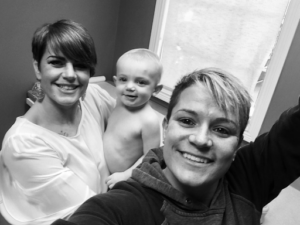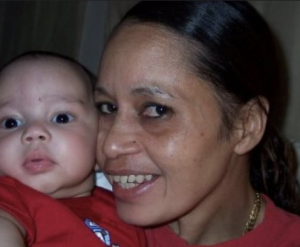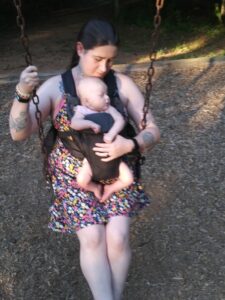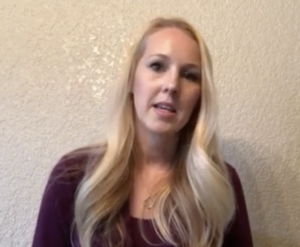
UPDATE: The Pregnant Workers Fairness Act has been signed into law and will go into effect on June 27th, 2023. Learn more here.
The women featured here, all of whom A Better Balance has worked with over the years, faced an impossible choice between their jobs and a healthy pregnancy. Denied the modest accommodations they needed like a stool or breaks to drink water, many of these women—along with countless others—suffered devastating health or economic consequences because federal law is failing pregnant workers.
In the face of hardship, these women have become advocates and voices for change, calling for strengthened legal protections for pregnant workers on the state and federal level. These women’s powerful stories have inspired A Better Balance to lead the call for The Pregnant Workers Fairness Act (S. 1486/H.R. 1065), which would ensure all pregnant workers—no matter where they live—are able to stay healthy and working when they need income most.
Read on below to hear from leading voices of the movement, or scroll down for state-by-state stories.
Leading Voices of the Movement
ARMANDA LEGROS, NEW YORK
ABB Community Advocate

As a worker for an armored truck company in New York City and the sole breadwinner of her family, Armanda asked to avoid heavy lifting during her pregnancy after she pulled a muscle on the job. Her employer responded by pushing her out, despite having previously accommodated a coworker who had injured his back on the job. Armanda lost her health insurance and had to apply for food stamps, struggling to make ends meet. Armanda testified before the US Senate Committee on Health, Education, Labor & Pensions in support of the PWFA in 2014. “Once my baby arrived, just putting food on the table for him and my four-year-old was a challenge. I was forced to use water in his cereal at times because I could not afford milk.I was scared every time I looked in my empty fridge,” she said.
LYNDI TRISCHLER, KENTUCKY
ABB Community Advocate & Former Client

Lyndi, a police officer in Kentucky, was pushed off the job when she requested light duty, robbing her of critical income when she needed it most. Because of the heavy equipment and physical demands of patrolling, when Officer Trischler became pregnant she consulted her healthcare provider who recommended she seek light duty. The City told her that its policy was to only give accommodations to employees injured on the job. At five and a half months pregnant, being forced out of work took a deep emotional and economic toll on her and her family. To make matters worse, she also learned that her son had a rare genetic disorder that meant he would not survive long after birth. “I returned to work a mere eight weeks after giving birth and after my son passed away. As heartbreaking as this experience was it was made all the worse by having to face workplace discrimination too. If there had been a clear law on the books, then this likely never would have happened.”
NATASHA JACKSON, SOUTH CAROLINA
ABB Community Advocate
 Natasha’s dream of owning a home disappeared after she was denied accommodations while pregnant. She was the highest-ranking account executive and the only female employee at a Rent-A-Center store in South Carolina. When she needed to avoid occasional heavy lifting required at her job, she was forced to go on leave. “The timing could not have been worse. My husband and I had just made a down payment on a house… Without my income, we were forced to back out of the contract.” Natasha ultimately lost her job and needed emergency public housing. “I am asking you to stand up for women like me so we can have an equal opportunity to support our families while protecting her health,” she urged Congress at a 2019 briefing on the Pregnant Workers Fairness Act.
Natasha’s dream of owning a home disappeared after she was denied accommodations while pregnant. She was the highest-ranking account executive and the only female employee at a Rent-A-Center store in South Carolina. When she needed to avoid occasional heavy lifting required at her job, she was forced to go on leave. “The timing could not have been worse. My husband and I had just made a down payment on a house… Without my income, we were forced to back out of the contract.” Natasha ultimately lost her job and needed emergency public housing. “I am asking you to stand up for women like me so we can have an equal opportunity to support our families while protecting her health,” she urged Congress at a 2019 briefing on the Pregnant Workers Fairness Act.
TASHA MURRELL, TENNESSEE
ABB Community Advocate & Former Client
 Tasha worked at a national logistics company’s warehouse in Memphis, Tennessee. Despite receiving a doctor’s note saying she needed a lifting restriction and complaining of extreme stomach pain, she was forced to continue lifting on the job. One day, she told a supervisor she was in pain and asked to leave early; the manager said no. Tragically, she had a miscarriage the next day. “It’s not right for companies to treat us like this,” she said. “It’s hurtful, for me and the other women, to even speak out on losing our babies. But I feel empowered. You never know who you might help by speaking out.”
Tasha worked at a national logistics company’s warehouse in Memphis, Tennessee. Despite receiving a doctor’s note saying she needed a lifting restriction and complaining of extreme stomach pain, she was forced to continue lifting on the job. One day, she told a supervisor she was in pain and asked to leave early; the manager said no. Tragically, she had a miscarriage the next day. “It’s not right for companies to treat us like this,” she said. “It’s hurtful, for me and the other women, to even speak out on losing our babies. But I feel empowered. You never know who you might help by speaking out.”
TAKIRAH WOODS, NEW JERSEY
ABB Board Member & Community Advocate, Former Client

At 14 weeks pregnant, Takirah, a family services worker in New Jersey, was advised by her doctor not to lift over 15 pounds, something she only rarely did. When she requested the accommodation, her employer forced her to take unpaid leave. Desperate to keep her job, she asked her doctor to lift the restriction, even though it could compromise her health and pregnancy. But then, she learned about her rights under New Jersey’s Pregnant Worker Fairness Act. After explaining the law to her employer, she was reinstated with light duty for the rest of her pregnancy. Thanks to New Jersey’s law, was able to return to work with light duty and avoid complications.
Read more stories from workers who called ABB’s helpline after experiencing pregnancy discrimination on the job under the state-by-state drop-downs below:
JOCELYN, a social services caseworker in Alabama, was seven months pregnant with her third child when she requested a reduced schedule because the high stress and her pregnancy had caused back pain and a higher heart rate. Her employer refused to reduce her schedule. A month before her due date, her doctor wrote a letter requesting for her to be on bedrest due to the body pains she was experiencing—she had to take unpaid leave. With a reasonable accommodation, she may have been able to avoid bedrest and using up her leave.
KIARA*, a physical therapist assistant in Alabama, had a high-risk pregnancy and needed accommodations to limit her exposure to clients, in order to minimize her risk of contracting COVID-19. Without a PWFA, she was left guessing whether or not her job could accommodate her to protect her health.
CARRIE*, a public employee in Arizona, requested to work from home due to concerns about her pregnancy after several of her coworkers tested positive for COVID and was denied under her employer’s policy. Her work is computer-based and could be done from home, but without a PWFA, Carrie did not have a clear right to pregnancy accommodations.
Halfway through her pregnancy, SAM RILEY, a former ABB client who worked as a police officer in Florence, KY, could no longer go on patrol due to the pain and discomfort of the heavy patrol equipment she needed to carry. She was denied an accommodation and forced to use up her leave before her child’s birth. Alongside Officer Lyndi Trischler, she shared her story with legislators and the public to ensure no woman in Kentucky will have to go through what they did.

See LYNDI TRISCHLER’s story in the “Leading Voices of the Movement” section above the drop-down menu.

DENIZER was a cashier for a large grocery store in Louisiana. In spring 2019, when she was almost 5 months pregnant, she went to the hospital because her legs were swelling and was told by a doctor that she had almost had a miscarriage:
“My doctor recommended that I take occasional breaks to rest and that I not lift over 15 pounds in order to stay healthy and prevent miscarriage. My supervisor offered to accommodate me by putting me on self-checkout where I would not have to engage in heavy lifting, but the store’s management said they ‘don’t do light duty,’ denied my accommodation request, and fired me. As a result, I almost lost my home multiple times. When this happened, COVID-19 procedures just went into effect, so I could not find work and none of the other jobs wanted to hire me because of the fact of just being pregnant–like it is a disease. The farther along you get the harder it is to get financially stable. I was without a job for the reminder of my pregnancy and two months following. When I tried to reapply to the job in question, they denied me after my son was born.”
DANIELLE had recently been promoted to assistant manager at a gas station in Maryland when she learned she was pregnant. She asked for basic accommodations like a stool to sit on, and brought in a doctor’s note asking to be put on light duty. Management denied her these accommodations and instead cut her hours. She gave birth prematurely at 36 weeks pregnant. “While there is no definitive evidence that my son’s [sensory processing disorder] was caused by the treatment I received at work, there is research that links maternal stress with low birth weight and preterm delivery.”

DIANA, a letter carrier in Minnesota, was given a heat restriction by her doctor in the summer during her pregnancy, limiting her time outside on extremely hot days. Even though her employer provided indoor work for work-related conditions, she was never permitted to work inside. Each day she couldn’t work outside, she had to use a valuable sick day or annual leave day. As a result, she had no paid leave left when her baby was born. “Going without my salary right when I had the added expense of a new baby was very difficult for me and my family. I feel like I was punished for being pregnant.”

JORDAN worked as a cashier at a major retailer in Mississippi when she was pregnant. Her doctor requested that she stop lifting heavy objects and reduce her schedule because she began to experience preterm contractions at six months pregnant. Due to the low staff, she was still lifting boxes even after her doctor advised her to follow the weight restriction, and after several doctor’s visits due to dehydration and heavy lifting, her employer was still not allowing her to have frequent water breaks or sitting breaks:
“I feel like if this act would have been intact whenever I was pregnant, it would have given me a leg to stand on. When I was working there, I felt like I couldn’t say anything because I really didn’t have a fighting chance.”
Jordan is currently a Community Advocate with A Better Balance.
Click here to watch Jordan tell her story.

TESIA BUCKLES, a retail store employee in Missouri, called us when she needed to carry a water bottle as an accommodation due to her pregnancy:
“I started to become really dizzy and nauseous, and I had asked them if I could have a water bottle to kind of help with that, just near my workspace, and they refused me that…We were in one of the hottest parts of the store, and I was nearly fainting every day, and they denied me that right as well. I never expected to be treated that badly, so it really threw me off. I thought because the conditions were kind of bad with the heat, the slick floors, and multiple COVID cases going around, that things would be different and I would be accommodated. But I wasn’t. They told me that I would have to take unpaid leave, or I would have to quit. I decided that it would be best for my health and the health of my child to quit my position, and this caused my financial situation to be entirely different.”
Tesia is currently a Community Advocate with A Better Balance.
Click here to watch Tesia tell her story.

See TAKIRAH WOODS’s story in the “Leading Voices of the Movement” section above the drop-down menu.

A single mother of three, YVETTE had worked at the same grocery store in New York City for 11 years. Having suffered miscarriages in the past, she knew her pregnancy was high-risk, and she gave her employer a doctor’s note with a lifting restriction. Instead, she was fired, despite the fact that an employee with a shoulder injury had been accommodated with lighter work. She lost her health insurance and had to go on Medicaid, and she and her family survived on food stamps and savings. “My employer told me there was no job for me with those limitations, but I know there was work I could have done, like working in the deli…When I finally returned to work three months after giving birth, I had no savings left.”

HILDA GUZZMAN had worked at a retail store in Long Island, New York for three years when she became pregnant. As her pregnancy progressed, it became very uncomfortable to stand at the cash register for eight to ten hours at a time. Denied her request for a stool, she began to experience complications, including bleeding and premature labor pains, and was put on bed rest. With no paid leave, she and her family struggled to make ends meet. “These physical problems landed me in the emergency room every few days. Although I could have kept working if I had been allowed to sit on a stool, because my employer wouldn’t let me, my doctor finally put me on bed rest to get me off my feet.”

BETZAIDA CRUZ CARDONA, a customer service cashier for a large national retail chain in Rochester, New York, was given a lifting restriction after experiencing illness and finding out she was pregnant. Despite being cleared to work, her employer told her she should “stay home, take care of her pregnancy, and rest,” and that she would have to reapply for her job after giving birth. The company later claimed she quit, preventing her from receiving unemployment insurance. With no paycheck, she became homeless and had to rely on family and friends for shelter. “I never thought a company I worked hard for would throw me away so easily.”

FLORALBA FERNANDEZ was working at a thrift shop in the Bronx, NY when she became pregnant. As part of her job, she carried heavy piles of clothing. She had a history of miscarriage and worried about the risk to her pregnancy and her baby if she continued to lift such heavy loads. Knowing that other workers had been temporarily transferred to other positions with less physically demanding work, she asked to do the same. Her boss told her to bring in a doctor’s note. But when she did, she was sent home on unpaid leave. “How do they expect me to pay rent, to buy food?” she wondered.

See ARMANDA LEGROS’s story in the “Leading Voices of the Movement” section above the drop-down menu.

ASHLEY from North Carolina was 35 weeks pregnant with her second child when she was terminated from her job at a nursing home. During her pregnancy, she requested and was denied assistance from heavy lifting and additional breaks to rest her feet. Her employer even refused to provide her with breaks to eat or check her blood sugar, despite her gestational diabetes diagnosis.
NICOLE HOUCK worked at a major retailer in North Carolina. Early on in her pregnancy, she asked to take additional bathroom breaks, but her requests were repeatedly denied. She tried to formally request accommodations, but the process was slow and she was continually denied bathroom breaks. The experience left her angry and embarrassed, and because of the ordeal Nicole quit her job. A law like the Pregnant Workers Fairness Act would have made it easier for her to access the simple accommodations she needed. Nicole is currently a Community Advocate with A Better Balance.

RACHEAL, an employee of a skilled nursing facility in Ohio, submitted a doctor’s note to her employer recommending that she work from home due to her high-risk pregnancy. Racheal could easily perform all of her non-patient care duties from home and the facility has enough staff on hand to easily cover the patient care duties she would otherwise be responsible for. Despite that, Racheal’s employer rejected her request to work from home.
MEGAN, an hourly manufacturing worker based in Oregon, was pushed onto unpaid leave after she brought in a doctor’s note advising she not bend too much on the job. Instead of working with her to accommodate this truly modest request, her supervisors pushed her out onto leave that same day—3.5 months before her due date. Megan suffered serious economic hardship as a result.

JACQUELINE, a massage therapist in Pennsylvania, was invited to return to work full-time when her place of employment reopened after being closed for several months due to COVID. At the time, Jacqueline was in her third trimester of pregnancy and asked to return to work on a part-time basis due to her pregnancy-related medical needs, which she had previously raised with her employer. Her employer said they couldn’t accommodate her and wished her luck. When she asked for clarification about whether she was still an employee, she received no response.
CRYSTAL*, a nurse in Pennsylvania, contracted the coronavirus while at work. Her employer provided her with leave while she quarantined, but her doctor was concerned about her safety upon return to work, especially given her pregnancy. She wanted to cut back her hours to limit her risk of exposure, but without a PWFA, she didn’t doesn’t have a clear legal right to an accommodation.
CHARLOTTE*, a nurse in Pennsylvania, was advised by her doctor to avoid contact with patients who had tested positive for, or were suspected to have, COVID-19. Her employer accommodated others with restrictions by placing them on other units or allowing them to shift to remote roles, but they told her they would not accommodate her, and that she was not eligible for unemployment because there was work available for her to do. She was forced to use her PTO when assigned to COVID-19 units, but since she didn’t have much time off available, she had to work on units with COVID-positive patients several times, risking her health and the health of her pregnancy. Charlotte* is currently a Community Advocate with A Better Balance.
See NATASHA JACKSON’s story in the “Leading Voices of the Movement” section above the drop-down menu.

IMANI* is a behavioral care worker in Tennessee. Due to increased cases of COVID-19 at her place of work, she requested a transfer to a different position, but was denied. The next month, she was mysteriously taken off the schedule and not given a reason why, though she suspected it was because she was pregnant.
AMANDA, a veteran and an ER tech in Tennessee, was advised not to lift more than 25 pounds by her doctor at 29 weeks pregnant. Although lifting patients was a part of her job as an ER technician, “there had always been more than enough staff members on hand to help complete this task; when I became pregnant, my coworkers were always happy to assist me,” she said. Despite this fact, Amanda was forced onto unpaid leave and lost her health insurance. “Needing to apply for public assistance just to survive felt like the lowest point in my adult life. I had worked since I was 15-years-old, I was the first in my family to earn a college degree, and I served proudly in the military. My husband is also currently serving in the Army Reserve. We had always been proud to give back to our country and community, yet our community was failing us.”

In early March 2020, SHAKEIRA SMITH, a preschool teacher in Tennessee, requested that she be able to work part-time during her pregnancy, since she had severe anemia. Her requests were initially pushed off, and she was then laid off along with the rest of the staff due to COVID-19. When the school was scheduled to reopen, she reminded her boss that she would need to work part-time; a few days later she was informed that she was still laid off. Shakeira is currently a Community Advocate with A Better Balance.

See TASHA MURRELL’s story in the “Leading Voices of the Movement” section above the drop-down menu.

CARLY*, a medical device salesperson in Texas, requested a transfer to a regional office with fewer COVID-19 cases because she was concerned about the health of her pregnancy. Carly frequently came into contact with COVID-19 patients without any enhanced protective gear, which was in low supply at her facility. Despite this, her employer denied her request without considering any alternative options for a reasonable accommodation to keep Carly safe and on the job.
JENNIFER, a family nurse practitioner in Texas, told her manager she was pregnant and needed to limit her exposure to COVID units. She was high-risk due to a medical condition. She was told she needed to transfer to a different location that had a huge outbreak of COVID cases, and requested to see patients through telehealth, which she knew a doctor with an autoimmune disease was permitted to do, but they declined her request. One of the owners told her that “she was no good to them pregnant,” and they needed someone who could work without restrictions. She had no choice but to continue working, exposing herself to COVID-19, and risking her health:
“I was devastated. I needed to work to support my family, I also needed health insurance for my pregnancy. I was put into a position to choose between safety and supporting my family and maintaining my health insurance…The whole situation was terrifying. It’s common sense not to discriminate against a pregnant woman, but unless the law reflects that, it’s going to keep happening. I know I speak for moms out there, when I say we are exhausted. “
Click here to watch Jennifer tell her story.

LISA*, a registered dietitian in Texas, requested an accommodation to work from home because she felt unsafe working in her office with the presence of positive COVID cases and insufficient precautions. However, her employer denied her request even though 90% of her job could have been successfully done at home, and forced her to take FMLA leave until she had her baby. Lisa* is currently a Community Advocate with A Better Balance.
MIA*, an employee at a staffing agency in Wisconsin, was pregnant and, due to concerns related to COVID-19, her doctor advised her to work from home. Everyone at her company worked from home for part of the pandemic, but her employer eventually started bringing people back into the office. Mia needed to continue working from home, but without a PWFA in her state, she didn’t have a clear right to do so.
SANDY worked at a national nutrition retail store, when several weeks into her pregnancy, she began to feel dizzy and nauseous at work, and her doctor advised her to avoid heavy lifting on the job. Her manager refused, instead increasing her workload to be more physically strenuous. She eventually had to seek immediate medical attention after experiencing stabbing pains in her uterus, and she was forced to quit her job rather than continue to jeopardize the health of her pregnancy. She and her family became reliant on government assistance and struggled to make ends meet for years to come. “My family was placed in a stressful position fraught with numerous bills and shut off notices.”
*indicates names have been changed to protect anonymity.




